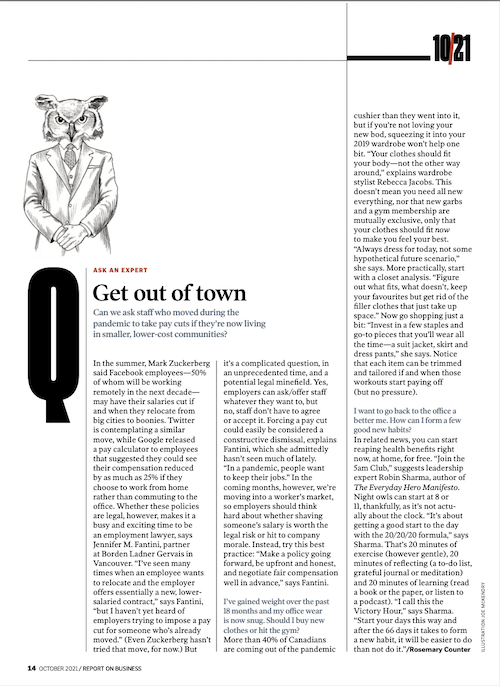Get out of town
Report on Business: Ask an Expert
Can we ask staff who moved during the pandemic to take pay cuts if they’re now living in smaller, lower-cost communities?
In the summer, Mark Zuckerberg said Facebook employees—50% of whom will be working remotely in the next decade—may have their salaries cut if and when they relocate from big cities to boonies. Twitter is contemplating a similar move, while Google released a pay calculator to employees that suggested they could see their compensation reduced by as much as 25% if they choose to work from home rather than commuting to the office. Whether these policies are legal, however, makes it a busy and exciting time to be an employment lawyer, says Jennifer M. Fantini, partner at Borden Ladner Gervais in Vancouver. “I’ve seen many times when an employee wants to relocate and the employer offers essentially a new, lower-salaried contract,” says Fantini, “but I haven’t yet heard of employers trying to impose a pay cut for someone who’s already moved.” (Even Zuckerberg hasn’t tried that move, for now.) But it’s a complicated question, in an unprecedented time, and a potential legal minefield. Yes, employers can ask/offer staff whatever they want to, but no, staff don’t have to agree or accept it. Forcing a pay cut could easily be considered a constructive dismissal, explains Fantini, which she admittedly hasn’t seen much of lately. “In a pandemic, people want to keep their jobs.” In the coming months, however, we’re moving into a worker’s market, so employers should think hard about whether shaving someone’s salary is worth the legal risk or hit to company morale. Instead, try this best practice: “Make a policy going forward, be upfront and honest, and negotiate fair compensation well in advance,” says Fantini.
I’ve gained weight over the past 18 months and my office wear is now snug. Should I buy new clothes or hit the gym?
More than 40% of Canadians are coming out of the pandemic cushier than they went into it, but if you’re not loving your new bod, squeezing it into your 2019 wardrobe won’t help one bit. “Your clothes should fit your body—not the other way around,” explains wardrobe stylist Rebecca Jacobs. This doesn’t mean you need all new everything, nor that new garbs and a gym membership are mutually exclusive, only that your clothes should fit now to make you feel your best. “Always dress for today, not some hypothetical future scenario,” she says. More practically, start with a closet analysis. “Figure out what fits, what doesn’t, keep your favourites but get rid of the filler clothes that just take up space.” Now go shopping just a bit: “Invest in a few staples and go-to pieces that you’ll wear all the time—a suit jacket, skirt and dress pants,” she says. Notice that each item can be trimmed and tailored if and when those workouts start paying off (but no pressure).
I want to go back to the office a better me. How can I form a few good new habits?
In related news, you can start reaping health benefits right now, at home, for free. “Join the 5am Club,” suggests leadership expert Robin Sharma, author of The Everyday Hero Manifesto. Night owls can start at 8 or 11, thankfully, as it’s not actually about the clock. “It’s about getting a good start to the day with the 20/20/20 formula,” says Sharma. That’s 20 minutes of exercise (however gentle), 20 minutes of reflecting (a to-do list, grateful journal or meditation) and 20 minutes of learning (read a book or the paper, or listen to a podcast). “I call this the Victory Hour,” says Sharma. “Start your days this way and I promise you, after the 66 days it takes to form a new habit, it will be easier to do it than not do it.”
